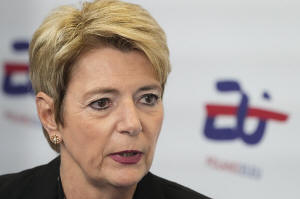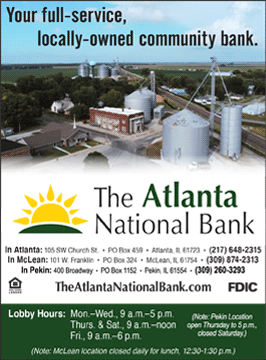President of wealthy Switzerland rushes to Washington to try to avert
steep US tariffs
[August 06, 2025] By
JAMEY KEATEN
GENEVA (AP) — After weeks of working with U.S. officials to try to avoid
hefty tariffs on Swiss goods, negotiators from Switzerland got
assurances that a deal was all but done. Swiss businesses vowed to pour
tens of billions in investment in the United States in the coming years.
Still, President Donald Trump said no to any special deal. Now a
scramble is underway ahead of Thursday, the deadline for when the
whopping 39% tariff on Swiss products announced last week goes into
effect.
Switzerland’s President Karin Keller-Sutter and other top officials
traveled to Washington on Tuesday to try to convince Trump that the
measure — among the highest from the Trump administration — was too much
and could cut profits for famed Swiss industries like chocolates and
watchmaking.
The new rate is over 2 1/2 times higher than the one on European Union
goods exported to the U.S. and nearly four times higher than on British
exports to the U.S. — raising questions about Switzerland’s ability to
compete with the 27-member bloc that it neighbors.
Under the U.S. announcements from last Friday, the export duties imposed
on Swiss companies will now only be surpassed by those on firms from
Laos, Myanmar and Syria, which are facing 40-41% rates.
A cautionary tale
Switzerland's case is a lesson in do’s and don’ts of doing business with
Trump. The thinking goes, if a rich country with economic might that
excels in technology, pharmaceuticals and finance can’t convince the
U.S. president to scale back the high tariffs, who can?

Trump himself seems to be focused on a single, high number:
Switzerland’s trade surplus in goods with the U.S.
In an interview with CNBC on Tuesday, Trump alluded to a recent call he
had with Keller-Sutter, saying “the woman was nice, but she didn’t want
to listen” and that he had told her: “We have a $41 billion deficit with
you, Madame.”
It was not immediately clear where that $41 billion figure came from.
According to the U.S. Census Bureau, the U.S. ran a $38.3 billion trade
imbalance on goods last year with Switzerland. That figure excludes
exports of services.
Keller-Sutter, who also serves as Switzerland’s finance minister, has
faced criticism in Swiss media over the last-ditch call with Trump
before a U.S. deadline on tariffs expired Aug. 1, which some say
appeared to make things worse.
A surprise move
The 39% rate is even higher than the 31% on Swiss goods announced on
Trump's “Liberation Day” in early April — before the Swiss started
negotiating with U.S. officials. The new figure took many Swiss business
leaders by surprise.
“It’s hard to negotiate when you’re dealing with someone as
unpredictable as Donald Trump,” said Ivan Slatkine, head of the
Federation of Romandie Enterprises, which groups companies in the
French-speaking part of Switzerland.
[to top of second column] |

Swiss federal president Karin Keller-Sutter attends the Informal
Meeting of EU Ministers for Economic and Financial Affairs and
Central Bank Governors in Warsaw, Poland, on April 11, 2025. (AP
Photo/Czarek Sokolowski, File)
 “We had a (Swiss) government that
gave the impression the deal was done, it only awaited a signature
from the president,” Slatkine told The Associated Press over the
phone. “We have the impression that we were punished, but we don’t
know why.”
The United States is Switzerland’s second-biggest trading partner
after the EU, which nearly surrounds the Alpine country of more than
9 million.
The Swiss government said Tuesday's trip was meant to “facilitate
meetings with the U.S. authorities at short notice and hold talks
with a view to improving the tariff situation for Switzerland.”
Swiss officials have argued that American goods face virtually zero
tariffs in Switzerland, and the Swiss government says the wealthy
Alpine country is the sixth-biggest foreign investor in the U.S. and
the leading investor in research and development.
Switzerland’s powerful pharmaceutical industry — which promised tens
of billions of investments in the U.S. in recent months amid the
tariff worries — is exempt from the 39% rate.
But Slatkine said the steep tariff level could be aimed to send
Switzerland's Big Pharma — epitomized by Roche and Novartis — a
message that it too could come under pressure.
The Swiss stand
The trip comes a day after Switzerland’s executive branch, the
Federal Council, held an extraordinary meeting and said it was “keen
to pursue talks with the United States on the tariff situation,”
according to a government statement.
After consulting with Swiss businesses, the council said it had
developed “new approaches for its discussions” with U.S. officials
and was looking ahead to continued negotiations.
"Switzerland enters this new phase ready to present a more
attractive offer, taking U.S. concerns into account and seeking to
ease the current tariff situation," the council said.

According to figures published by the Swiss Embassy in Washington,
the U.S. has been Switzerland’s most important goods export market
since 2021, while Switzerland is the fourth most important export
market for U.S. services — not goods.
The bilateral trade volume in goods and services between Switzerland
and the U.S. reached a total of $185.9 billion in 2023, the embassy
says on its website.
All contents © copyright 2025 Associated Press. All rights reserved |